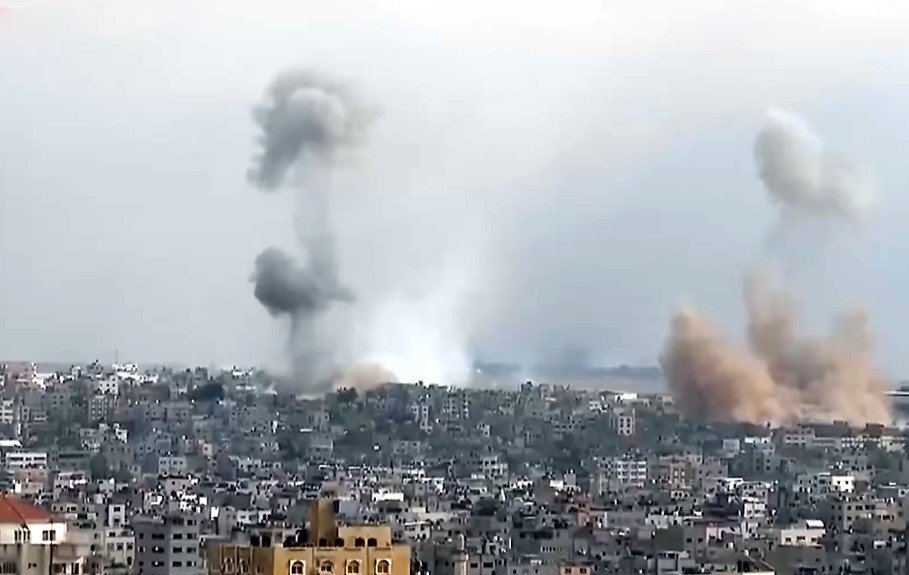Tensions across the Middle East are now touching everyday British lives, as the UK government issues stark travel advisories for two key nations.
The Foreign, Commonwealth & Development Office (FCDO) has officially warned British nationals to avoid travel to Israel and Jordan, citing escalating military conflict between Israel and Iran. The warning comes amid increasing fears that the already volatile situation could spiral further and destabilize the broader region.
Mounting Chaos Drives Urgency in FCDO Guidance
The updated advisory was released late Monday evening, shortly after Israeli airstrikes targeted key infrastructure in Tehran — including the Iranian state broadcaster’s headquarters. Iran has already retaliated, launching a barrage of missiles that struck several Israeli cities, killing civilians and overwhelming air defense systems.
The FCDO’s language left little room for ambiguity. UK citizens are now advised not to travel to Israel or Jordan “under any circumstances.” For those already in-country, the advice is simple: follow local authority orders and stay alert.
One senior UK official described the tone of the warnings as “the most serious we’ve seen for this region in years.”
What This Means for Travellers and Expats
For Brits currently in Jordan or Israel — including tourists, students, business travelers, and expats — this news is more than a government formality. It’s a shift in the ground reality.
Reports from Amman and Tel Aviv suggest a visible uptick in both security forces and civilian anxiety. Local governments have begun advising embassies to prepare contingency plans.
• Flight disruptions are already occurring, with several carriers canceling departures to Tel Aviv’s Ben Gurion Airport.
• Airspace closures could be announced at short notice, especially if the conflict spills over into southern Lebanon or Iraq.
• Protests and flash demonstrations have erupted in Jerusalem and Amman alike, prompting some UK citizens to shelter in hotels or private homes.
A British teacher based in Amman told us via WhatsApp, “The embassy sent out an alert around 5:30 a.m. local time. I’ve packed an emergency bag just in case, but for now, we’re hunkering down and hoping this cools off.”

The Bigger Picture: How Israel vs Iran Escalated So Quickly
While the immediate flashpoint came after Iran’s missile attacks killed 11 civilians in Herzliya, the roots of this escalation run deeper. Last week, Israel launched “Operation Rising Lion,” a coordinated set of airstrikes targeting Iran’s nuclear and military assets.
Iran has long maintained that its nuclear program is for civilian energy use. But Israeli officials remain unconvinced, and intelligence leaks suggest Tel Aviv has grown increasingly wary of Tehran’s nuclear capacity.
Tehran’s leadership, furious over what it called “a violation of sovereign space,” began returning fire Sunday evening. By Monday, multiple cities in both countries had experienced blasts, blackouts, and broadcast interruptions.
How Jordan Got Pulled Into the Crossfire
At first glance, Jordan isn’t a direct player in the Israel-Iran feud. But geography doesn’t lie.
Jordan shares borders with both Israel and Iraq, and sits just miles from the Israeli-occupied West Bank. As such, military debris and stray ordnance are legitimate threats — not just hypotheticals.
The FCDO made this clear, stating: “Ongoing hostilities could escalate quickly and pose real risks for the wider region, including Jordan. Military debris has already landed in several border areas.”
A Jordanian air controller speaking anonymously said several commercial flights have had to reroute due to “unauthorized military activity” in shared air corridors.
A Look at FCDO’s Current Regional Warnings
To help clarify the extent of risk, here’s a quick snapshot of the FCDO’s current Middle East advisories as of June 17, 2025:
| Country | Advisory Level | Notes |
|---|---|---|
| Israel | Do Not Travel | Active conflict, missile strikes, air defense malfunctions |
| Jordan | Do Not Travel | Risk of spillover conflict and debris from Israel-Iran escalation |
| Lebanon | Avoid All But Essential Travel | Political unrest, protests, risk of regional conflict spread |
| Egypt (Sinai) | Avoid All Travel | Ongoing insurgency, kidnapping risks |
| Iran | Do Not Travel | Airstrikes, missile barrages, risk of internal crackdown |
It’s the most comprehensive red-level advisory map for the region in over a decade.
Trump’s Role: Pressure, Posturing and Possible Deals
Former President Donald Trump made headlines once again after cutting short his G7 summit appearance to “deal with the Middle East situation.” Before departing, he told reporters, “It would be foolish — very foolish — for Iran not to agree to this deal.”
Sources close to the Trump camp suggest he’s been in communication with Israeli PM Benjamin Netanyahu and is pushing a backchannel resolution, though no formal proposal has emerged publicly.
It’s a classic Trump move — mix drama with diplomacy — but it’s too soon to tell whether it will douse the fire or add fuel.
Meanwhile, back in London, Labour MPs are calling for a special session to review the UK’s Middle East engagement strategy. Some are even asking whether additional embassy evacuations might be needed.
What Comes Next?
The Middle East has always walked a tightrope between tension and collapse. But this week, the rope looks thinner than ever.
A missile misfire. A civilian casualty. A missed call between two generals. That’s all it could take to spark something worse.
For now, the UK’s message to its citizens is loud and clear: Don’t go. If you’re already there, stay safe and stay put.
